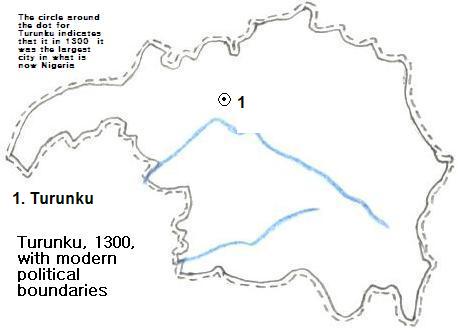Turunku
Turunku, located in today's Kaduna State, had an estimated population of 30 to 40 thousand in 1300, the largest city in what is now Nigeria.1 and was the capital of the state later known as Zazzau or Zaria.2 It's relative status diminished in the following centuries and in 1536 the city of Zazzau (Zaria) became the state's capital.(3) Its residents were Hausa speaking, and from the middle of the 15th century were Moslems.4
Turunku is now called Sabon Turunku, and is not to be confused with another Turunku within Kaduna State.5
Before the 20th century, the city name was rendered in Ajami script, perhaps like this6: ترنكو



Footnotes
(1) In Chandler's table, Cities of Africa, 1300, in the section, South Moslems, Turunku, is listed between Mali, estimated to have 40 thousand residents, and Kano, said to have 30 thousand (Tertius Chandler, Four Thousand Years of Urban Growth, 2nd ed., 1987, The Edwin Mellen Press).
(2) See http://www.arkeologi.uu.se/afr/projects/BOOK/Andah/andah.pdf, accessed 11/11/2009.
(3) Chandler, ibid., page 290.
(4) Entry for the state of Zaria in Courtland Canby, Encyclopedia of Historic Places, vol. 2 (Facts of File Publications, 1984).
(5) One can distinguish the historic site primarily by comparing satelite views; the walls can be seen easily around Sabon Turunku. Sabon Turunku is also closer to Zaria. The location is east of Jarji, about half the east-west distance between Jarji and Igabi.
(6) Possible errors. Vowels are mostly omitted here. Normally Arabic syllables that are consonant-vowel end in a long vowel, and long vowels are represented orthographically, and long u is normally one of them, so I represented the final vowel with a waw. But it is not clear how the Ajami script (adaption of Arabic script to non-Arabic) would handle the other vowels. Nor is it clear if the 'n' would be represented. Further the choice of teh rather than tah, and kaf rather than qaf is speculative.